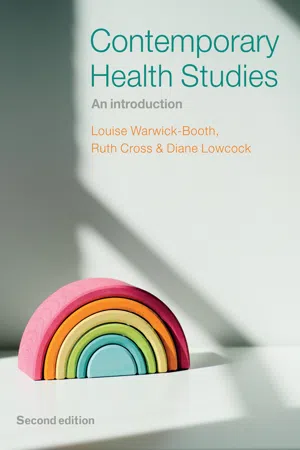
Contemporary Health Studies
An Introduction
- English
- ePUB (mobile friendly)
- Available on iOS & Android
About this book
Contemporary Health Studies provides an accessible introduction to current issues and key debates in understanding and promoting health. Its up-to-date, global focus places a strong emphasis on the social, political and environmental dimensions of health.
Part One sets the scene by looking closely at the definition of 'health' and outlining the aims and purpose of health studies. Part Two explores the different disciplines that underpin health studies, such as sociology, psychology, anthropology and health psychology, incorporating new theoretical frameworks to help readers understand health. Part Three applies this knowledge to address the determinants of health, including chapters on individual factors, the role of public health, the latest policy influences on health and the growing importance of the global context. Each chapter contains contemporary statistics and evidence alongside carefully developed learning features designed to highlight the fundamentals of each topic, to apply these to in-depth case studies – from global antibiotic resistance to the challenge and promise of digital data –, and to pose questions for reflection and debate.
Contemporary Health Studies is an essential guide for undergraduate health students written by three authors who have a wealth of teaching experience in this subject area. Their book will inspire readers to consider the human experience of health within contemporary global society as it is mediated by individual, societal and global contexts.
Frequently asked questions
- Essential is ideal for learners and professionals who enjoy exploring a wide range of subjects. Access the Essential Library with 800,000+ trusted titles and best-sellers across business, personal growth, and the humanities. Includes unlimited reading time and Standard Read Aloud voice.
- Complete: Perfect for advanced learners and researchers needing full, unrestricted access. Unlock 1.4M+ books across hundreds of subjects, including academic and specialized titles. The Complete Plan also includes advanced features like Premium Read Aloud and Research Assistant.
Please note we cannot support devices running on iOS 13 and Android 7 or earlier. Learn more about using the app.
Information
Part I
Understanding and Promoting Health
1
What is Health?
Key learning outcomes
- understand and articulate the complexities of health as a concept
- reflect on, define and defend your own perspective on health
- summarize and critique key debates about the concept of health within the literature, drawing on theoretical and lay understandings
Overview
Definitions of health
Learning task 1.1
Defining health
Statement:
- What does the word ‘health’ mean to you?
- What does it mean to you, to be ‘healthy’?
- Can you come up with a definition that captures what you mean by ‘health’? If you can, try not to focus on this in terms of health as being only the absence of disease (or there being something ‘wrong’).
Table of contents
- Cover
- Dedication
- Title Page
- Copyright
- Foreword
- Acknowledgements
- How to use this book
- Introduction
- Part I Understanding and Promoting Health
- Part II The Disciplinary Context of Health Studies
- Part III Influences upon Health
- Glossary
- References and suggested reading
- Index
- End User License Agreement